Top Farm-to-Table Hotel Restaurants
From house-hived honey to freshly foraged mushrooms, ingredients at these sustainable operations don’t travel far to the table.
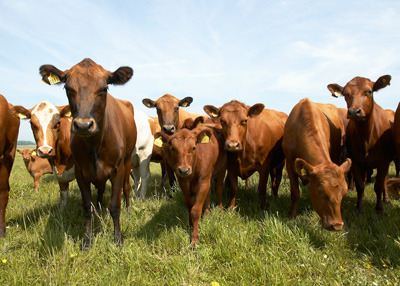
Angavallen, Vellinge, Sweden
At Angavallen, located in southern Sweden, owner Rolf Axel Nordström allows heritage-breed pigs, chickens, cows and sheep to roam freely year-round over the farmland and hotel grounds. “It’s organic farming the way it’s been done for 70 years,” says Nordström, emphasizing that only regional farm stock, like his gray-and-black-spotted pigs and Swedish forest sheep, could thrive on his regimen of sustainable nonintervention. (Every August, for example, he lets the pigs into his fields to clean up the weeds.) Meanwhile, more than 20 full-time employees keep the farm running, which, with 130 sows, 200 sheep and 130 cows, produces more than enough stock for the seasonal tasting menus. One fall specialty is blood pudding, made to celebrate the traditional Swedish holiday of St. Martin’s Eve on November 10; other delicacies include veal, lamb, sausage, housemade cheeses, foraged mushrooms and eight varieties of mustard made from seeds grown on the property. Rooms, from $121; Norra Håslövs Byväg; 46-40/423-250; angavallen.se.

Number One, The Balmoral Hotel, Edinburgh, Scotland
Number One, the Michelin-starred restaurant at the Balmoral Hotel, serves fresh Scottish produce all year but delves into the farm-to-table trend via old-fashioned foraging. Executive chef Jeff Bland and foraging expert Andy Fraser bring hotel guests to their favorite spots in the surrounding countryside to root around for wild Scottish girolle mushrooms, carrageen moss, pea flowers and elderberries. Bland then cooks an alfresco meal, pairing the gathered herbs and vegetables with locally sourced game. Number One’s seasonal menu varies, but autumn outings bring rose hips, hawthorn and blackthorn berries and plenty of mushrooms for the restaurant’s ratatouilles. Rooms, from $240; 1 Princes St.; 44-131/556-2414; thebalmoralhotel.com.
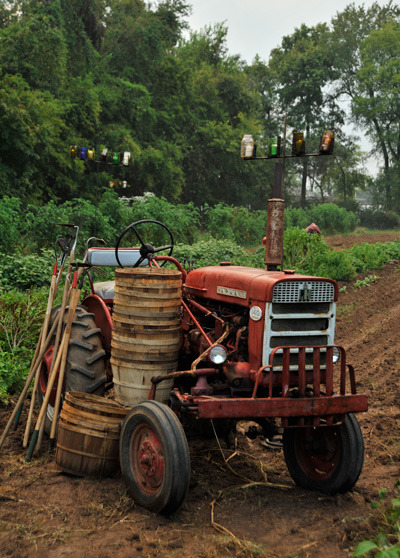
Capitol Grille, The Hermitage Hotel, Nashville, Tennessee
Nashville’s Capitol Grille in the Hermitage Hotel serves a seasonal menu supplied by its own grounds, the 66-acre farm at Glen Leven, which includes a biodynamic heirloom garden and a herd of heritage cattle. Executive chef Tyler Brown has the help of a cheerful volunteer staff, and about 80 percent of the harvest heads to his kitchen for immediate use or, as in the case of a bumper crop of green cherry tomatoes, pickling. Fall marked the first honey collection from the farm’s beehives, while a cattle herd that has tripled in size since February caused a stir by escaping their pasture and consuming seedlings for the planned fruit orchard. “It’s a steep learning curve,” Brown says of his farming exploits.Rooms, from $279; 231 Sixth Ave. N.; 615-244-3121;thehermitagehotel.com.

Yi Feng Court and Essence, Fairmont Yangcheng Lake, Kunshan, China
Seventy percent of the produce at Fairmont Yangcheng Lake comes from Yue Feng Organic Farm, a 200-acre spread of organic orchards and gardens situated along the edge of the surrounding protected body of water. A 30-member staff cultivates greens, squash, tomatoes, herbs, guava, loquat and citrus fruit for use in the hotel’s two restaurants, Yi Feng Court and Essence. Bi Luo Chun green tea, a Suzhou region specialty, grows among hives of wild local bees, which produce up to 90 pounds of honey a day—enough to satisfy afternoon tea service and the pastry chef. November welcomes guests from all over Asia eager to sample hairy crabs from the lake. The local delicacy, prized for its roe, is served steamed and dipped in dark vinegar. Rooms, from $141; 3668 W. Ma’anshan Rd.; 86-512/5780-0888; fairmont.com/yangcheng-lake-kunshan.

Gibb’s Farm, Karatu, Tanzania
Sprawling over 75 acres on the slopes of Tanzania’s Ngorongoro Crater, Gibb’s Farm sits on an 80-year-old coffee plantation and has three decades of experience producing organic fruit, vegetables, coffee and meat. In its nose-to-tail system, 90 percent of kitchen ingredients come from the farm, and scraps are either composted or fed to the pigs, which in turn become salami and bacon in the smokehouse. More than 20 active beehives provide fresh honey and pollinate the heritage gardens, while six dairy cows produce enough milk for the cheese, butter, yogurt and ice cream enjoyed by guests. Chef Lisa Campbell’s “pick, clean and serve” approach centers on fresh, seasonal ingredients and relies on a team of 16 farmers and vegetable gardeners to harvest produce and tend the animals. The farm bustles all year, yielding 11,000 pounds of coffee between May and December and roasting the beans each morning for cups of joe in the dining room. Rooms, from $535; 757-428-1166;gibbsfarm.net.
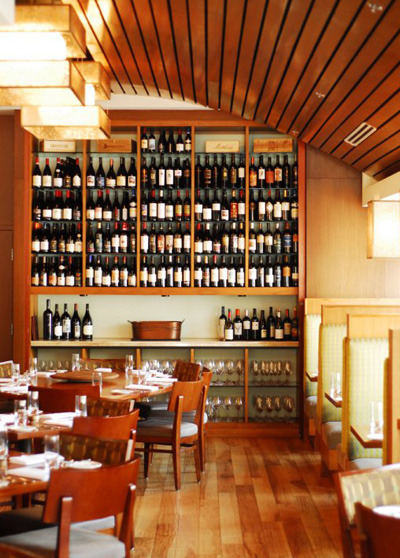
Trellis, The Heathman Hotel, Kirkland, Washington
Located on the outskirts of Seattle, Trellis restaurant at the Heathman Hotel is famous for a salad made with greens served within two hours of being harvested from a field 15 minutes away. Executive chef Brian Scheehser and a crew of four gardeners farm approximately seven acres of organic fruits and vegetables, including a 300-tree apple orchard that produces applesauce, gallons of cider and homemade cider vinegar. He raises each plant from a seed—a requirement for many of the antique bean and tomato varieties he favors, which are unavailable nearby—and is making room in his root cellar for this fall’s harvest: 4,000 pounds of winter squash, 25 gallons of honey from his hives and numerous flats of tomatoes preserved in cooperation with a local cannery. Scheehser also collaborated with Cherry Valley Dairy to create a duo of aged jack cheeses that will be ready in late winter—a blueberry-and-basil variety and a spicy pepper jack made from garden-grown peppers. Rooms, from $196; 220 Kirkland Ave.; 888-264-5494; heathmankirkland.com.
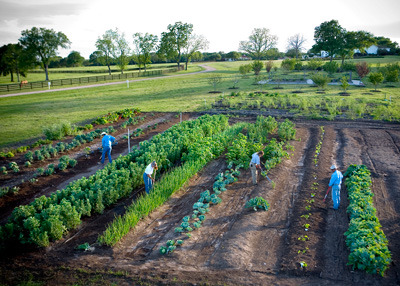
The Inn at Dos Brisas, Washington, Texas
Executive chef Zachary Ladwig benefits not only from a location in the heart of Texas cattle country but also from an organic garden that sprouts more fruits, vegetables and herbs than his kitchen can possibly use. On its 313-acre property, the Inn at Dos Brisas maintains a 10-acre garden, an orchard of persimmon, pear, apple and pomegranate trees and two greenhouses. Farmer Lisa Roese grows up to 20 varieties of each vegetable, including heirloom tomatoes, basil and local favorites like wild dewberries and spilanthes (a mouth-numbing herb sometimes used as a toothache remedy). Ladwig plays with textures from the garden this season, serving a warm pumpkin salad with huckleberry, roasted pumpkin seeds and housemade ricotta cheese. Rooms, from $560; 10,000 Champion Dr.; 979-277-7750; dosbrisas.com.
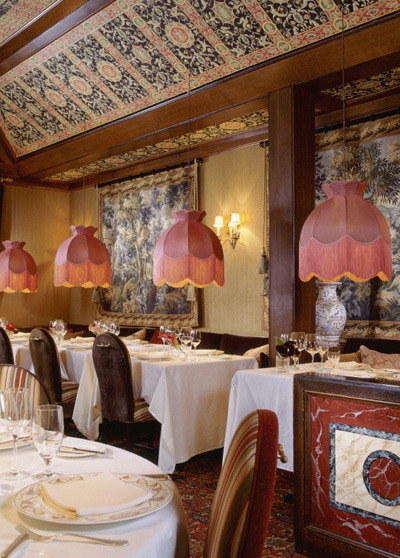
The Inn at Little Washington, Washington, Virginia
Chef and owner Patrick O’Connell has focused on farm-to-table fare since opening the Inn at Little Washington more than 30 years ago—but these days he doesn’t need to reach much farther than his backyard for fresh ingredients. On a small orchard and two compact organic plots totaling a half acre, farmer-in-residence Joneve Murphy grows more than 125 produce varieties, working with seed traders to cultivate uncommon strains like blue tomatoes, pea-sized currant tomatoes for pickling and Japanese shishito peppers (O’Connell chars these and serves them with shrimp dishes in the dining room). Murphy says the garden paths draw curious guests, many of whom visit with the Rhode Island Red hens that hold court in their chandelier-adorned coop or the flock of sheep guarding Francesca the llama. “Guests come down when I’m working and say, ‘Oh, I had that for dinner last night,’” Murphy says. “They know the food is really fresh.” Rooms, from $425; 309 Middle St.; 540-675-3800; theinnatlittlewashington.com.
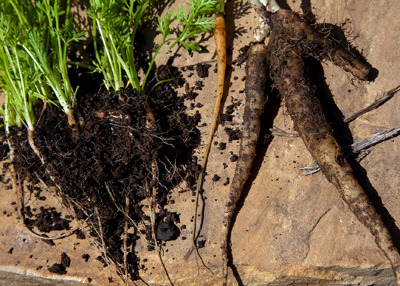
The Restaurant at Meadowood, St. Helena, California
There is a secret to chef Christopher Kostow’s Michelin three-star restaurant at Meadowood: He grows tailored and hard-to-find produce in the hotel’s half-acre garden. “We’ll experiment with things we’re not sure we’ll like or that we can’t find anywhere else,” says gardener Christine Kim, who manages Meadowood’s organic garden and greenhouse, cultivating staples like heirloom tomatoes, sunchokes, radishes and microgreens along with exotic newcomers, such as tiny Mexican sour gherkin cucumbers and a water spinach so prolific, it requires a special planting permit. Plans to expand the henhouse are still in the works, but Meadowood’s current holdings of a dozen or so beehives, five chickens and a tribe of goats keep Kim busy. The plot inspires Kostow to feats of culinary creativity, like baking turnips in dirt from the garden—an innovation that Kim says “just happens from constantly seeing the vegetables in their context.” Rooms, from $600; 900 Meadowood Ln.; 707-963-3646; meadowood.com.

Otahuna Lodge, Christchurch, New Zealand
A largely self-sufficient property that cultivates meat, dairy and produce, Otahuna Lodge is the modern incarnation of the original sheep and cattle station that began more than a century ago. “We believe if you’re going to raise your own stock, you have an obligation to use the entire animal and raise them humanely,” says managing director Hall Cannon. Accordingly, pigs live in a tepee-like swine chalet, and nothing is wasted once the animals head to the butcher. Prosciutto, coppa, bacon and sausage come together in the estate’s newly converted outbuildings; another structure houses a mushroom laboratory of fungus-filled logs. Executive chef Jimmy McIntyre takes guests to the organic potager garden to harvest vegetables before preparing a fresh meal with farm-raised chicken, eggs and lamb or foraged wild porcini mushrooms that grow under the property’s massive English oaks. The farm’s original two-acre orchard includes apple, pear, quince and mulberry trees, as well as some showy Victorian varieties, like Uvedale’s St. Germains, which produce nearly inedible six-pound pears. Rooms, from $905; 224 Rhodes Rd.; 64-3/329-6333; otahuna.co.nz.
(Source: Departures)
